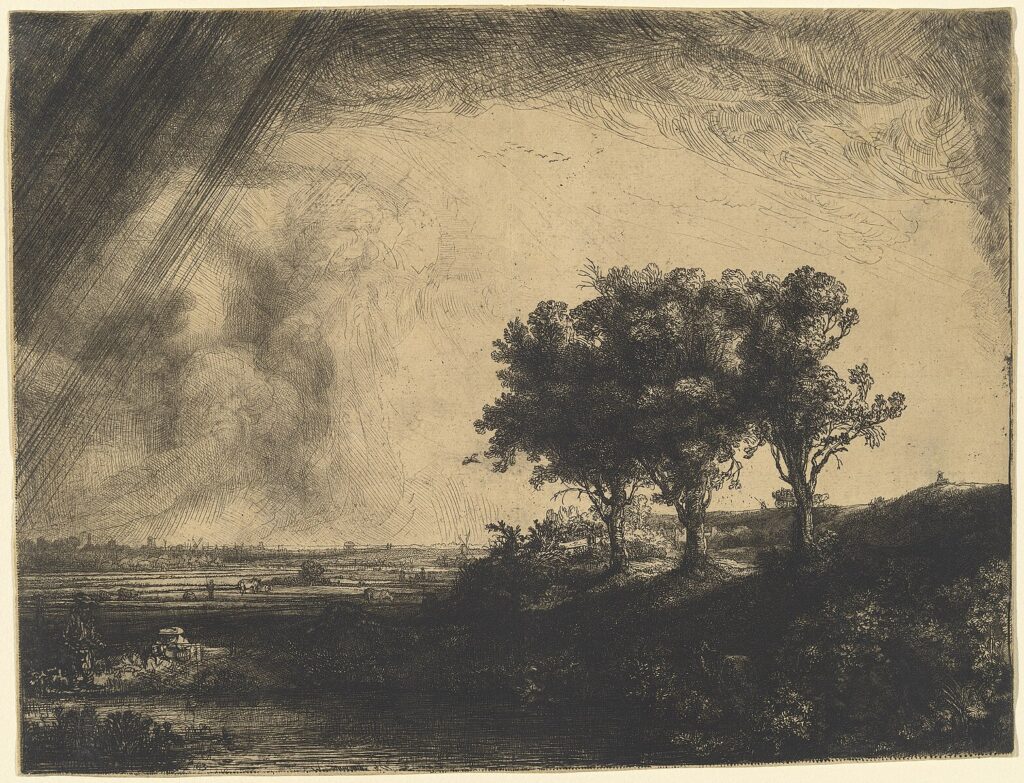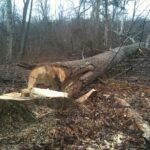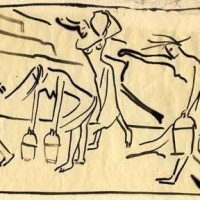Three ash trees once grew in the parking lot next to my childhood home. The first of the three was useless to me, as its lowest branch was far too high to climb. The second had branches more amenable to my purposes, and I climbed them occasionally for a change of pace. But the third—the middle tree in the line of three—was perfect for climbing in every way. The branches began low and were balanced, circling like a staircase up to a high open hand. And from this hand an intrepid climber could even ascend still further, if she were light and brave.
My brother and I climbed this tree nearly every day for years on end in the rainless Southern California weather. I had a few spots I particularly liked in its branches, and I would sit there for hours, dreaming away. My brother had other purposes for the tree, however. Mainly he used it to terrify me (which was how he used any tool he had at hand, generally speaking). His favorite trick was to inch out precariously to where one of the branches nearly met those of the next tree and then take a wild, flying leap into the other tree’s crown.
I hope my mother never knew about that.
In the parking lot below, where we rode our bikes, my brother would ride his bike at top speed right toward mine, screeching to a halt mere inches from my frantically pedaling leg. I screeched, too, every time, but with voice, not tires, of course. Other times he would give me a ride through the lot in the green cart that we used to haul yard waste and would periodically leap in the air while pulling, so that I would almost fall out and knock my head.
Whether atop or beneath trees, such are the delights of older brothers.
My father cared for the trees, as well. He was adept at pruning, and every so often he would go out and do a light prune of the three trees, especially the useless tree that actually was very useful to him (as it shaded his car). We thought this a fair trade with the Lutheran church that owned the lot and the trees—they provided the trees for shade and climbing, and we pruned them and raked their leaves. But one year someone in the congregation got the idea that they would prune the trees themselves, and so one fateful afternoon I came home from school to an arborist’s nightmare. I had by this time learned a fair bit about pruning myself from my parents, and I was shocked and appalled by the hatchet job that the church had inflicted upon my trees.
“They cut all the big stuff and left all the little stuff!” I hollered to my brother in despair. And indeed, they had done just that: lopped off the bulk of the branches and left mainly twigs coming out of the lowest fork in each tree. There was, of course, not a leaf left to be seen.
Things were different with the trees after that. They never recovered to where we could climb them again; the “little stuff” quickly took over and a new limb structure was never established. In any case, soon enough I went away to college and found new trees to climb there. Eventually, I settled in my current home in Virginia, where this year I was once again reminded of the importance of pruning time.
There’s plenty to prune on our current property each year, but there’s something especially poignant about pruning during a difficult personal season. I have been in such a season lately, to my very great distress. Soon after the arrival of the new year I experienced a bewildering health crisis that came at me from a number of different directions. I am fortunate in that I am now recovering, but for a good three months I found myself extremely limited and tense with suffering.
Yet there was one thing I could still do despite all this. Although my vision, and my neck, and my sense of balance, and certainly my sense of hope, were all impaired, I could still prune. A few days in a row, in the weeks before bud break, I stepped outside for just moments at a time to carefully examine a quarter of the branches on our Rose of Sharon bush and clip here and there, just so. Then it was on to the hydrangeas, the grape vines, and our two hopeful apple saplings. The maple and the ornamental cherry got their fair share, as well, although these bigger jobs I could not quite complete. Even so, it hardly mattered to me, for I was doing something decisive, something that required confidence and skill, and something that relied upon the belief that new growth would surely come again.
As I pruned, I reflected on the three trees that once grew near my childhood home. They never recovered, as I have said, and after a few years the church brought in a truck and pulled them out by the roots. Now there are simply three empty dirt squares in the cement, evidence of what is dead, but once grew.
This is not my vision for pruning: to leave evidence of what once lived but is now dead. My hope lies in the other kind: to cut what is weak and encourage what is strong, to clip and cut decisively—even ruthlessly—but with attention born of long-earned skill and given in the service of new flourishing. This is the kind of pruning that in these past months, the Lord seems to have been giving me.
It is one thing to choose where to cut; it is another to be cut yourself. I would much rather not ache all over from the tension of my conditions, would much rather sleep long and well, would much rather use my eyes freely without any concern for strain. I would have dishwashing duty cut from my life, not reading novels. Yet here I am, still able to wash dishes, but fearfully wondering whether ever again I will comfortably read. I would be glad to be free of trepidation and to know the end of the story of this pain.
Yet while I sometimes make mistakes in my pruning, I know the good Lord never makes a false cut. He does not splint where he should sever and he does not sever where he should splint. I am not as willing a tree as I ought to be—I’d rather grow weakly and comfortably than trust in a future branch structure that I cannot see. Yet Someone sees. Can I trust in Him?
Lord, give us eyes to see.
Image Credit: Rembrandt van Rijn, “The Three Trees” (1643) via Wikimedia







4 comments
Monica Hamalainen
Beautiful piece, Dixie. Thank you for sharing this.
Dixie
Thank you, Monica! (And I’m so glad to see that you read FPR!)
Dixie
Thank you for the prayers!
William Smith
Lovely, dear sister! Just so, may we all respond to our Lord’s loving, sometimes “severe mercies”!
Thank you, and prayers sent!